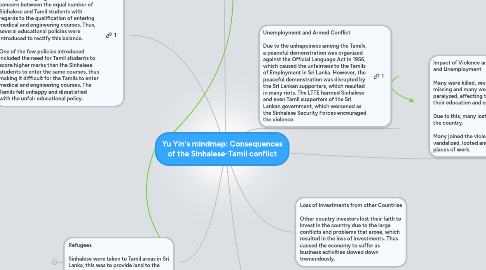Yu Yin's mindmap: Consequences of the Sinhalese-Tamil conflict
by ほ たる

1. Loss of Investments from other Countries Other country investors lost their faith to invest in the country due to the large conflicts and problems that arose, which resulted in the loss of investments. Thus caused the economy to suffer as business activities slowed down tremendously.
2. Unemployment and Armed Conflict Due to the unhappiness among the Tamils, a peaceful demonstration was organized against the Official Language Act in 1956, which caused the unfairness to the Tamils of Employment in Sri Lanka. However, the peaceful demonstration was disrupted by the Sri Lankan supporters, which resulted in many riots. The LTTE harmed Sinhalese and even Tamil supporters of the Sri Lankan government, which worsened as the Sinhalese Security Forces encouraged the violence.
3. Educational Unfairness Before 1970, university admissions were based on merit and exams were held in the English language. There was then a concern between the equal number of Sinhalese and Tamil students with regards to the qualification of entering medical and engineering courses. Thus, several educational policies were introduced to rectify this balance. One of the few policies introduced included the need for Tamil students to score higher marks than the Sinhalese students to enter the same courses, thus making it difficult for the Tamils to enter medical and engineering courses. The Tamils felt unhappy and dissatisfied with the unfair educational policy.
3.1. New node
4. Refugees Sinhalese were taken to Tamil areas in Sri Lanka, this was to provide land to the homeless Sinhalese peasants to live on and cultivate rice.
4.1. New node
5. Fall in Number of Tourists Tourism was a big income earner for Sri Lanka, which depleted due to the violence that was occurring often. Tourists feared of the dangers in visitng the country and cancelled plans to enter the country, which caused loss of jobs and the fall of the country's earnings. The economy suffered horribly due to this.
6. Foreign Intervention The major conflict in Sri Lanka caught the attention of India, which acted as a mediator after the 1983 riots but failed. This resulted in the loss of free will of Sri Lanka to make decisions for the country itself.
7. Impact of Violence and Armed Conflict and Unemployment Many were killed, several were missing and many were injured or paralyzed, affecting them badly in their education and employment. Due to this, many lost confidence in the country. Many joined the violence and vandalized, looted and burned their places of work.


